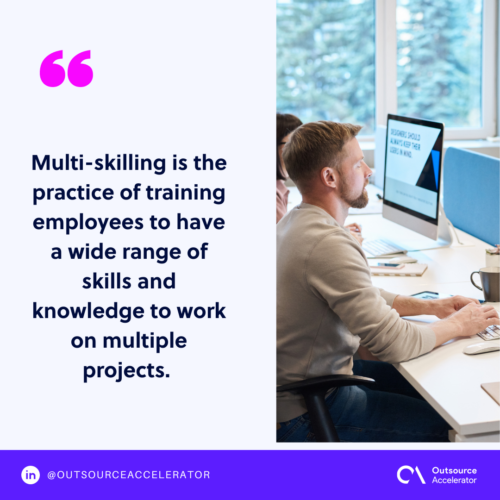Multi-skilling
Definition
What is multi-skilling?
Multi-skilling is the practice of training employees to have a wide range of skills and knowledge to work on multiple projects. Employers aim for employees to become flexible and perform tasks that are beyond their roles.
Types of multi-skilling
To improve flexibility and efficiency in the workplace, organizations implement multi-skilling.
Here are the different types of multi-skilling:
Vertical multi-skilling
Vertical multi-skilling happens when an employee acquires skills for higher roles such as supervisory or administrative support.
Horizontal multi-skilling
Horizontal multi-skilling is another type of multi-skilling wherein employees learn skills of the same level from a different sector or department in the organization.
There are two main types of horizontal multi-skilling:
Cross-skilling or dual skilling
Cross-skilling or dual skilling is when an employee learns other skills in addition to their main job. They are considered competent to execute two different tasks.
Skill broadening
Skill broadening, on the other hand, is when an employee learns minor skills while maintaining their original expertise. Its main purpose is to help them be more efficient in their role.
Depth multi-skilling
Depth multi-skilling is where an employee performs more complex skills to optimize operating costs. This is considered an asset when applying for a higher position in an organization.

Advantages of multi-skilling
Here are some of the advantages of acquiring and developing multi-skilled employees in an organization.
Flexibility
To accomplish tasks that lead to the success of a company, employers prefer a multi-skilled workforce. Employees can fill in tasks that need to be done immediately without worrying about manpower.
This maintains production levels in various situations where employees would otherwise be idle or profits would be lost.
Decreased labor costs
Companies can operate seamlessly with multi-skilled employees. Instead of waiting for work, a multi-skilled employee moves with it, which saves time and business finances.
Efficiency in planning
Efficient planning in business can deliver outstanding results that respond to the needs of the customers. With multi-skilled employees, companies can always focus on their goals.
Employee satisfaction
Employees used to learn multi-skills to adapt to changes in production. This leads to an increase in productivity in the workforce and employee retention rates.







 Independent
Independent




